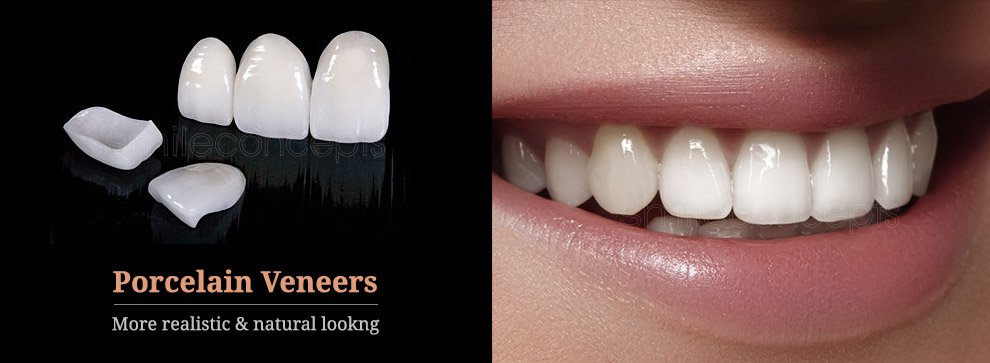What Are Veneers: Everything You Need to Know About a Perfect Smile
The Complete Review of Veneers: Types, Utilizes, and Their Influence on Your Smile
Veneers act as a popular remedy for people looking for to improve their oral visual appeals. These custom-crafted shells can efficiently mask imperfections such as discoloration and spaces. With two key types readily available, porcelain and composite resin, each offers unique benefits and constraints. The influence of veneers extends past simple appearance, influencing self-worth and social communications. Recognizing their advantages and kinds is necessary. What might this suggest for one's overall high quality of life?
Understanding Veneers: What They Are and How They Work
Veneers are slim shells, normally made from porcelain or composite resin, that are custom-crafted to fit over the front surface of teeth. They serve both useful and aesthetic purposes, providing a remedy for numerous dental flaws such as staining, voids, and minor misalignments. By sticking to the tooth enamel, veneers create a natural appearance while boosting the form and color of the teeth.
The procedure normally includes an initial consultation, where a dental practitioner analyzes the person's requirements and talks about preferred outcomes - Porcelain Veneers. Following this, a marginal quantity of enamel may be eliminated to accommodate the veneer. Perceptions of the teeth are then required to assure an exact fit. As soon as produced, the veneers are bound safely to the teeth using an unique dental adhesive. This treatment not only enhances the smile's appearance however additionally aids protect the underlying teeth from additional damage, making veneers a popular choice for numerous seeking a smile makeover
Types of Veneers: Porcelain vs. Composite Resin
The distinction in between porcelain and composite material veneers hinges on their material composition and attributes. Each type offers varying levels of longevity, price, and long life, affecting individuals' choices based on their specific demands. Recognizing these distinctions is important for making a notified decision pertaining to dental improvements.
Material Differences Described
While both porcelain and composite material veneers serve the same cosmetic function, they vary greatly in product homes, longevity, and aesthetic results. Porcelain veneers are crafted from a ceramic product that mimics the all-natural translucence of teeth, offering a natural look. Their smooth surface area is resistant to staining, making them an attractive alternative for those looking for a resilient visual. On the other hand, composite material veneers are made from a tooth-colored plastic material, using versatility and ease of application. They might not accomplish the exact same level of illumination or translucency as porcelain. In addition, composite veneers can be extra quickly shaped and fixed, making them a much more adaptable alternative in specific dental circumstances. Each type offers unique benefits customized to individual preferences.
Durability and Sturdiness
When comparing porcelain and composite resin veneers, longevity and longevity are considerable elements. Porcelain veneers are known for their stamina, usually lasting 10 to 15 years with correct treatment. Their strength against chipping and staining makes them a popular selection for people looking for long-lasting outcomes. On the other hand, composite material veneers typically have a much shorter life-span, averaging 5 to 7 years. While they can be fixed a lot more quickly if damaged, they are much more vulnerable to use and staining with time. The selection in between these products typically depends upon the person's way of living, aesthetic goals, and maintenance preferences. Ultimately, comprehending the differences in durability and sturdiness can direct clients in choosing the veneer kind that ideal matches their requirements.
Price Comparison Insights
When choosing in between porcelain and composite resin veneers, expense is an essential factor to consider. Porcelain veneers normally range from $800 to $2,500 per tooth, reflecting their toughness, visual allure, and resistance to discoloration. These veneers need a much more substantial treatment and specialized lab job, contributing to their higher cost. In contrast, composite material veneers are normally extra cost effective, setting you back in between $250 and $1,500 per tooth. They can be used in a solitary see, which reduces labor costs. However, composite veneers may need extra regular substitutes, possibly raising long-term expenditures. Eventually, the selection in between porcelain and composite material veneers relies on specific budgets and preferred end results, stabilizing first prices versus long life and visual outcomes.
The Advantages of Finding Veneers for Your Smile
Choosing veneers provides significant advantages for those looking for an enhanced smile. Their improved aesthetic charm can transform the appearance of teeth, while their stain-resistant properties guarantee an enduring brightness - What Are Veneers. This mix makes veneers a preferred alternative for individuals wanting to achieve a perfect smile
Enhanced Visual Charm
When people seek to boost their smiles, veneers typically arise as a favored solution due to their transformative aesthetic benefits. These thin shells, commonly made from porcelain or composite resin, can properly conceal blemishes such as chips, spaces, and misalignment. By mimicking the all-natural appearance of teeth, veneers provide a smooth, radiant smile. Their customizable nature permits a customized technique, enabling people to select shades and forms that best match their facial attributes. Furthermore, veneers can develop a consistent appearance, boosting general face balance. This visual enhancement not only enhances confidence but can also positively influence personal partnerships and social interactions, making veneers a preferred option for those wanting to attain a brighter, much more eye-catching smile.
Stain Resistance Benefits
Veneers not only enhance visual appeal however also provide substantial tarnish resistance, making them an attractive option for people concerned concerning keeping a bright smile. Made up of long lasting materials such as porcelain or composite resin, veneers are much less porous than all-natural teeth, which aids protect against the absorption of discolorations from typical perpetrators like coffee, tea, and red wine. This integral tarnish resistance permits people to enjoy their preferred beverages without fretting about discoloration. Porcelain Veneers. Additionally, the smooth surface area of veneers makes them easier to tidy, additional boosting their durability and preserving their immaculate look. Consequently, veneers read what he said offer a functional option for those looking for both appeal and performance in their oral treatment
The Refine of Obtaining Veneers: What to Anticipate

Although the procedure of obtaining veneers may seem daunting, recognizing the actions included can minimize worries. Originally, a consultation with a dental professional is needed to determine if veneers are the proper option for the individual's oral problems. Throughout this appointment, the dentist will certainly discuss desired outcomes and take impacts of the teeth.
Next, a 2nd visit is scheduled for tooth prep work, where a percentage of enamel is commonly eliminated to accommodate the veneers. Short-term veneers might be put while the custom-made ones are crafted in a dental laboratory, which normally takes a number of weeks.
When ready, the dentist will certainly place the veneers, making certain correct fit and shade before bonding them to the teeth making use of a special adhesive. After last adjustments, the dental expert will supply support on care. Understanding these steps can help individuals really feel extra comfy and educated throughout the veneer process.
Maintenance and Treatment for Your Veneers
Maintaining veneers needs constant treatment to guarantee their longevity and look. Correct oral hygiene is necessary; brushing twice daily with a non-abrasive toothpaste and flossing on a regular basis help stop plaque buildup around the veneers. Additionally, regular oral exams are essential for monitoring the condition of the veneers and attending to any prospective issues early.
When attacking to protect against damages, people need to stay clear of tough foods and excessive force. It's also a good idea to limit usage of tarnishing materials, such as coffee, tea, and merlot, as these can impact the veneers' shade over time.

Transforming Your Smile: Real-Life Impact of Veneers
A radiant smile can greatly enhance one's confidence and overall look. For many individuals, veneers work as a transformative solution, successfully addressing numerous oral concerns such as discoloration, gaps, and misalignment. These thin coverings, tailor-made to fit over the front of the teeth, can develop an unified and cosmetically pleasing smile.
Real-life instances highlight the extensive influence veneers can have. People often report an immediate increase in self-worth and social communications following their treatment. The newly found confidence can result in more opportunities in personal and professional life, as people really feel even more inclined to involve and share themselves.
In addition, the emotional advantages prolong beyond simple look; several experience boosted psychological wellness as they embrace their smiles. Subsequently, veneers not only boost physical qualities however likewise add substantially to general lifestyle, highlighting their value in aesthetic dental care.
Often Asked Questions
Just How Long Do Veneers Typically Last Prior To Requiring Substitute?
Veneers generally last in between 10 to 15 years prior to requiring substitute. Factors such as oral health, oral habits, and the kind of product utilized can influence their durability and total toughness. Regular dental examinations are suggested.
Can Veneers Be Eliminated, and if So, Just how?
Yes, veneers can be removed. A dental practitioner generally utilizes customized devices to carefully remove them from the teeth, making sure marginal damages to the underlying enamel, typically adhered to by essential changes or remediations for suitable visual appeals.
Are Veneers Suitable for Everybody's Oral Problem?

Will Getting Veneers Hurt or Require Anesthetic?
Obtaining veneers generally entails very little discomfort, and many people get neighborhood anesthesia to assure a pain-free experience. Sensitivity might happen momentarily afterward, yet many locate the process bearable and are pleased with the results.
Just How Do Veneers Affect Tooth Sensitivity After Placement?
Veneers can briefly increase tooth level of sensitivity due to the elimination of enamel and the bonding process. Most individuals experience a decrease in level of sensitivity find out in time as the teeth get used to the new veneers.
Veneers are thin coverings, commonly made from porcelain or composite resin, that are custom-crafted to fit over the front surface of teeth. Porcelain veneers are crafted from a ceramic material that imitates the natural transparency of teeth, offering a realistic look. Porcelain veneers generally important source range from $800 to $2,500 per tooth, showing their toughness, aesthetic allure, and resistance to staining. In contrast, composite material veneers are normally much more budget-friendly, costing in between $250 and $1,500 per tooth. Made up of durable materials such as porcelain or composite material, veneers are less porous than natural teeth, which aids avoid the absorption of discolorations from usual culprits like coffee, tea, and red white wine.